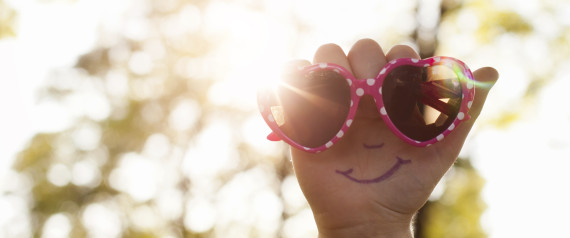
|
As a health editor, I spend the majority of my day poring over content related to, well, health. At HuffPost, we're lucky to talk to experts on a daily basis about how to live our best lives, both mentally and physically. Over time, you start to pick up on some things. Themes begin to emerge loudly and clearly. It becomes obvious what is considered a universal "good." These things are often relatively straightforward, and it's clear that life would be happier and healthier if we would just do them. Sure, some of these are easier said than done, but their premises are often simple. I wanted to share a few of my favorites: 1. Have a bedtime. Sleep is considered the third pillar of health, and for good reason. Research is only making it increasingly clear that not getting enough of the stuff can have serious health effects. Meanwhile, getting enough sleep is good for everything ranging from weight, to mood, to even the immune system. One of the simplest things you can do to ensure you get enough sleep each night is to set a bedtime. Forgive yourself if you can't meet it every night (I tell myself I need to be in bed by midnight, but life gets in the way, and all of a sudden it's 1:30 a.m.), but make a point to try to stick to it. 2. Understand what emotional intelligence is -- and make a point to cultivate it. To have emotional intelligence means to be "confident, good at working towards your goals, adaptable and flexible. You recover quickly from stress and you're resilient," psychologist Daniel Goleman previously told HuffPost. It's made up of five parts: social skills, empathy, motivation, self-awareness and self-regulation. And fortunately, these are all traits you can cultivate. Be curious about things beyond yourself. Know what you're good at and where you can stand to improve. Try to improve your ability to pay attention. 3. Take a minute. This is something I'm admittedly still working on. I'm an objectively fast person -- fast at walking, fast at eating, fast at talking, you get the gist. This also makes me very impatient, and also sometimes very unobservant -- stopping to smell the roses has never been my strong suit. But slowing down to appreciate life and all its little moments builds gratitude -- and that's a very healthy thing. 4. Cut out sugar where you can. I used to be a dessert fiend. Cupcakes, ice cream, brownies, if you put it in front of me, I would most definitely eat it. And growing up, I drank some sort of juice at every single meal (being mildly lactose intolerant meant instead of milk, it was OJ at breakfast, OJ at lunch, and OJ at dinner). But the more I learned about how too much sugar affects the body -- and how it manages to sneak into all the non-dessert-like foods I also eat -- the more I realized I had to wean myself off the sweet stuff. So I started small. Instead of dumping sugar into coffee, I slowly trained myself to go milk-only. (Now, coffee with sugar just seems too sweet.) Instead of drinking juice and soda with meals, I opt for water (and on that note, I don't keep any beverages besides water in my fridge at home). I don't buy cakes or cookies from the store, so I'm not tempted to eat them at 10 p.m. when I'm in my apartment. Don't get me wrong, I'll still indulge in a slice of birthday cake or some ice cream. But those are treats, and I've realized that treats are not meant to be eaten all day every day. 5. Find an exercise you actually enjoy. It's not exactly a secret how much I opposite-of-like running. I'll still do it, because #health, but there are certainly other ways I'd rather get my fitness in. And that's completely OK. Research has even shown that whether we think of fitness as "fun" or "exercise" affects how much we end up eating. For me, exercise is a pill best swallowed as volleyball. For you, it may be dancing, or swimming, or riding your bike. Don't think that just because you don't like "conventional" exercise -- running, going to the gym, etc. -- you're "bad at exercise." No such thing! 6. Know when to stay off your phone. This is another one of those things I'm still trying to be better at. There are times for Instagramming and texting, and there are times where it's truly obvious you're not present because your eyes are glued to your screen. I had one of those moments a few days ago, when I was out to dinner -- I was so focused on answering some work emails, that when I finally looked up, I realized my dinner companions were silent, and had been waiting for me to get off my phone. It was a disruption and a distraction, and frankly, quite rude. Let's all make a point to end the madness. 7. Drink more water. Here at Healthy Living, we've dubbed Health and Fitness Senior Editor Sarah Klein the "hydration expert" -- she is always seen with a water bottle in hand, and if there's ever a hydration question, she either knows the answer, or knows the expert to ask. In my years of working with her, I've tried to follow her lead. Not only does drinking water keep you feeling full -- so you're not ravenously hungry (and overeating as a result) -- it is also a way to not drink sugary beverages. When you're drinking water, you're not drinking soda or sugary juice. 8. Cook food yourself. Sure, on the surface, a salad is healthy. But when a restaurant loads it down with sugary salad dressing and croutons, it can be anything but. The same goes for any other food, whether it's ordered at a restaurant or found in the freezer aisle at the grocery store. What's become abundantly clear to me, is that the best way to truly know what you're eating is to just make it yourself. Your eyes may be widened at how much salt you're eating, for instance, when you're the one measuring the teaspoons into your dish. 9. Stop worrying so much. Writing this piece about worrying was an eye-opener for me. As a Type A person, I also tend to be a worrier -- always wanting to be prepared for the worst, with a Plan A, B and C for action. But here's a revelation: Worrying isn't actually action. Worrying is just getting in your own head, creating a spiral of worst-case scenarios (that often don't even end up happening) that is very rarely productive. Instead, focus on the present. Maintain perspective in a worrying situation, considering what's actually likely to happen. Have confidence that you willbe able to make it through. |
作为一名健康栏目编辑,我时刻关注着有关健康的各类信息。在《赫芬顿邮报》交流期间,我们有幸与健康专家进行了交流,了解了一些在日常生活中简单有效的保持身心健康的小妙招。随着时间的推移,你慢慢掌握一些生活方式,它们大张旗鼓的标榜着健康。这些被全球公认的好的生活方式,看似简单、直接,人们若能遵循它们,生活则会变得更加幸福、健康。事实上,这其中的很多都是“说比做容易”,但其实这些生活方式的前提都非常简单。在此,我要分享几条个人认为非常不错的生活方式。 1. 保持充足睡眠 睡眠有充分地理由被认为是人类健康的第三大支柱。越来越多的研究证实,睡眠不足会带来相当大的健康隐患,相反的,保持充足睡眠对于控制体重、保持心情和增强免疫力都有着至关重要的作用。想要每晚获得良好充足的睡眠,最简单有效的做法就是为自己设定一个“上床时间”,尽管你可以原谅自己在偶尔的几个夜晚没有遵守这个时间(尽管我常常告诫自己要在午夜前上床睡觉,但现实往往不如人意,一不小心就到了凌晨1点),但你依然要时刻提醒自己,坚持在“上床时间”准点睡觉。 2. 了解并培养情商 心理学家丹尼尔.戈尔曼曾对赫芬顿邮报如此定义情商:情商是个体所表现出的自信,能够努力实现自己的目标,并有较强的适应能力和灵活性;你弹性大,能够很快从压力中恢复。情商包含了5个部分,即社会能力、同情心、能动性、自我意识和自控能力。可喜的是,这5项能力都是可以通过后天培养的。你需要时刻对外界事物保持好奇心,充分了解自己的优势和弱势,并清楚哪些是可以改进的,此外,还需不断提升注意力。 3. 停下来休息一会儿 关于这一点,我依然在坚持在做。我是生活节奏超快的那类人——就是你了解的那类人,走路快、吃饭快、说话也快。而这种生活方式也容易让人失去耐心、变得浮躁,那种停下来闻一闻路边玫瑰香的事情,过去的我从来都是不屑一顾的。然而,当我学会放慢速度来感受和欣赏身边事物时,一切都是那么美好,而我的生活也变得更健康了。 4. 尽可能少吃糖 我曾是个甜品控,无论纸杯蛋糕、冰激凌还是布朗尼,只要放在我的面前,那是绝没有剩下的。长大后,我每餐都会喝一些果汁(因为乳糖不耐受,我只能用果汁取代牛奶)。然而,当我不断了解到糖是如何威胁身体健康的、又是如何渗透到那些我们经常食用的非甜点类食物中的,我意识到必须放弃这些甜食和添加了糖的食物了。我尽可能的从小的方面开始做起,我慢慢的训练自己不往咖啡里加糖,只喝加了牛奶的咖啡(现在,加了糖的咖啡对我而言都太甜了);用餐时,我也放弃了果汁和苏打水,只喝白水(事实上,在我的冰箱里,除了水,你找不到任何其他饮料了)。我不去店里购买蛋糕、饼干,这样就避免了晚上10点我还在家里吃点心。不要误会了,其实我依然会偶尔吃上一片蛋糕或一些冰激凌,但这些只是对自己的小小奖励,我清楚的明白这并不代表我每天都要给自己来些奖励。 5. 找到一项你真正喜爱的运动 我一点都不否认我讨厌跑步,但是我依然会去运动,除了跑步人们还有许多可以选择的运动方式。研究显示,我们如何定义健身——“有趣的事”或“锻炼”,将影响我们的进食量。对我而言,最好的运动是排球;对你而言,可以是跳舞、游泳或骑自行车。不要以为你不喜欢诸如跑步、健身房这些传统运动方式,所以你对运动不在行。行了,完全没这回事! 6. 适时放下手机 这是另一条我坚持实行的生活方式。很多时候你都在发短信或浏览社交网络,还有很多时候你“在似不在”,因为你的眼睛始终牢牢盯着你的手机屏幕。前不久我也做过这样的囧事,当我和好友出去晚餐时,我始终低头用手机回复那些工作邮件,当我抬起头时,看见好友正安静的等待着我结束和手机的“约会”。和朋友用餐时不断的看手机不只是对用餐的打扰,确切的说,非常的粗鲁、不礼貌。所以,是时候放下你的手机了。 7. 多喝水 我们将《健康生活》栏目的高级健康健身编辑沙拉.克莱尔成为“水专家”,因为她手里时刻都拽着一瓶水,如果有任何与水有关的问题,她都能给你答案,即使不能,她也能告诉你谁能回答你的问题。与她共事多年,我一直试着听从她的建议。喝水不仅能带来饱腹感,预防你时刻想要大快朵颐(并导致过量进食),同时也避免了饮用含糖饮料。当你喝水了,你就不会想去喝苏打水或果汁了。 8. 亲自下厨 沙拉看起来是非常健康的食物,然而,当餐厅里端上来的沙拉覆满了含糖沙拉酱和黄油小面包时,它就不那么健康了。其他食物也同样如此,无论是餐厅里的菜肴,或陈列在食品店冷柜里的食物。我非常清楚的知道,想要了解自己吃下去的食物,唯一的方法就是自己下厨。你一定会睁大眼睛看清自己究竟吃下去了多少盐,正如你需要好好掂量你该往一道菜里添加多少盐。 9. 放宽心,别多虑 写这一条真是让我大开眼界了。作为A型人,我也属多虑人群,常常想要做好万全之策。但事实是,担忧并非行动。担忧只在你自己的脑海中形成一系列最糟糕情况的设想,而这些情况通常很少,甚至根本不会发生。事实上,你该关注当下,保持前瞻性,只考虑那些最有可能发生的情况,并相信自己有能力处理好这些突发情况。 扫一扫,关注微博微信
  (译者 daraluoyemin 编辑 高晴) |
